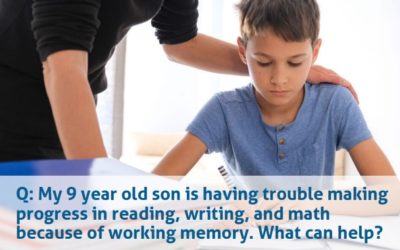Q: My 9 year old son is having trouble making progress in reading, writing, and Math because of working memory. What can help? Working memory is a type of memory that allows us to temporarily hold information 'in mind' to be used for other cognitive tasks. Some people...
Reading Hacks: How to Get the Most Out of Independent Reading
The more you read, the easier it is to read, but what if reading is still difficult? Is the best way to reading independently just toughing it out and persisting although you may be skipping words or reading at such a slow pace it's difficult to know what you're...
Dyslexia Wars: Attack on Dyslexia Definition
A brief note about about an article in Hechringer Report (also published in Scientific America). It is attacking the "unexpected" difficulty in reading (in the presence of average or above-average IQ) that has been a part of the dyslexia definition since its...
Severe Dyslexia Reading [Premium]
Q: My daughter is severely dyslexic and is having trouble making progress reading. She is homeschooled. How can I help? A: Ideally, the best person to provide specific information about your student’s dyslexia is the professional who performed a comprehensive assessment. The following information is not specific to your daughter, but more general information in the hopes some of it may be helpful to you. Many severely dyslexic children have trouble perceiving or remembering sounds, sound-letter associations, or the letters that comprise the different spellings of words. If a student has significant working memory limitations, she or he may also have to learn in little bits which may add to the time words are mastered. RE-LEARNING AGAIN AND AGAIN If the problem is that a […]
AI Voices Make Listening Easy
With AI, artificial voices for book reading are getting better. People who struggled with electronic voices in the past, may find themselves pleasantly surprised as AI-voices develop more natural voice pauses and even emotional tones that make listening more...
The Importance of Guided Repeated Oral Reading in Training of Skilled Readers
By Brock Eide, MD MA, co-founder of Dyslexic Advantage and Neurolearning SPC In recent years, research on reading development has revealed that truly skilled reading requires two kinds of skills: the ability to quickly and accurately decode or “sound...
The ‘Why’ of Accommodations: Motor, Language, Speed [Premium]
Although dyslexia is typically defined in terms of its effect on reading, research studies have established much broader effects on motor systems, language, and speed of processing. If professionals are not aware of these differences, they won’t request accommodations for the students who they test, and as a result, these students will miss out on supports that help them in higher education and beyond. MOTOR AND LANGUAGE – WRITING There are motor difficulties associated with dyslexia that are unrelated to reading (Turesky et al., 2023), but rather than being a difficulty affecting speed or coordination, it is more subtle – affecting automatic learning. If you are able to sign your name without thinking about all the twists and turns your fingers make for […]
Great Reading and Audiobook Apps for Summer
If you or your student haven't tried audiobooks or e-books, summer is a great time. You can get a public library card for free, and have access to thousands of e-books, audiobooks, comics and graphic novels, and movies and magazines from the convenience of your...
Teaching the Schwa [Premium]
What is the schwa? The schwa sound is the most common sound in English and symbolized by the upside-down e in International Phonetic Alphabet and is pronounced like “uh” in words like “the”. It’s a maddening sound because it’s not really associated with any specific letter of the alphabet…and that affects spelling as well as reading aloud. Sarah’s Snippets Literacy Nest has a nice series of post on teaching the schwa. Emily recommends starting with “a” words like “alike”, “panda”, “soda”, or “Alaska” that say “uh” instead of the long a sound. Add a little kinesthetic action like thumping the table to make recognizing the schwa more memorable. Students may need to master stressed and unstressed syllables first; The Call […]
Reading Mode: How to Make Web Pages Easier to Read
Do you find it easier to read webpages that aren't cluttered? If so, you're not alone. Popups and even photos can be distracting. Many browser reading modes offer customizations like font size, color, and sometimes character and line spacing. Typically, many dyslexic...
Dyslexia: What About Sequencing? [Premium]
Sequential memory is a challenge for many dyslexic people – and you may be surprised how many very accomplished dyslexics have trouble with it. SEQUENCING DIFFICULTIES PRESENT MANY WAYS Parents and students may first notice difficulties memorizing sequences when they get asked to recite the alphabet or numbers up to 10. Trouble appears learning the days of the week or months of the year (harder) but some are able to compensate with music or associated mnemonics. “You mean you don’t have to sing the ABC song in order to remember which letter is in front of the other? ” – Business Executive Sequencing errors contribute to problems in reading, spelling, writing, and math, but also specific subjects like history or literature. Students with sequencing […]
Learning Irregular Words [Premium]
Question: Why does dyslexia intervention focus so much on phonics and phonological awareness when so much of English doesn’t follow rules? Every comprehensive structured literacy program includes lessons and intensive practice with sight words and orthographic mapping as well as morphology (the study of words from the perspective of small meaning parts like prefixes, roots, and suffixes). So students undergoing remediation are actually becoming deep scholars of language. It can be pretty intense. Regular phonological patterns are learned first, then irregular words that don’t fall into classic phonics rules. For example, an open syllable is a syllable that ends in a vowel (the word “she”, for instance). The rule for open syllables is that the vowel is long. Closed syllables are syllables that are closed […]




![Severe Dyslexia Reading [Premium]](https://www.dyslexicadvantage.org/wp-content/uploads/2023/12/Severe-Dyslexia-Reading-2-400x250.jpg)


![The ‘Why’ of Accommodations: Motor, Language, Speed [Premium]](https://www.dyslexicadvantage.org/wp-content/uploads/2023/07/The-Why-of-Accommodations-Motor-Language-Speed--400x250.png)

![Teaching the Schwa [Premium]](https://www.dyslexicadvantage.org/wp-content/uploads/2023/05/Teaching-the-Schwa-Premium-1-1.jpg)

![Dyslexia: What About Sequencing? [Premium]](https://www.dyslexicadvantage.org/wp-content/uploads/2023/04/Sequencing-400x250.jpg)
![Learning Irregular Words [Premium]](https://www.dyslexicadvantage.org/wp-content/uploads/2023/03/Dyslexic-Advantage-400x250.png)













